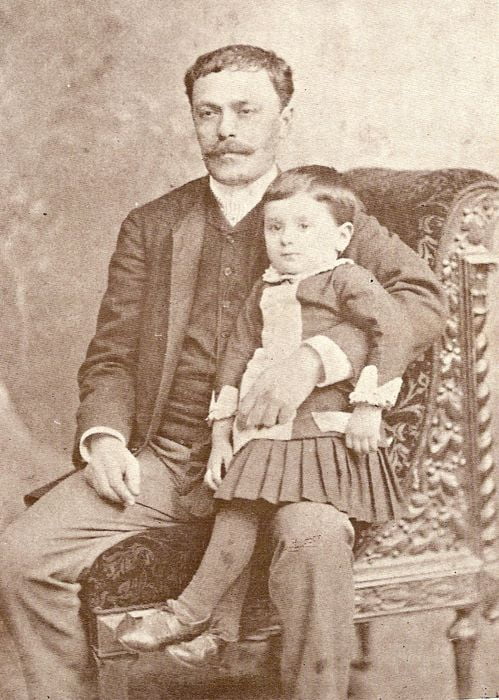On the main road there was a good deal of traffic, an unceasing noise of wheels accompanied by -the rhythmic sound of horses` hoofs trotting upon the smooth asphalt.
But suddenly the traffic stopped, and from Copou a group of people could be seen approaching, gesticulating and shouting excitedly.
The crowd appeared to be escorting somebody: soldiers, a guard and various members of the public. Curious onlookers appeared at every door of the inn.
“Ah,” thought Leiba, “they have laid hands on a thief.”
The procession drew nearer. Sura detached herself from the others, and joined Leiba on the steps of the inn.
“What is it, Sura?” he asked.
“A madman escaped from Golia.”
“Let us close the inn so that he cannot get at us.”
“He is bound now, but a while ago he escaped. He fought with all the soldiers. A rough Gentile in the crowd pushed a Jew against the madman and he bit him on the cheek.”
Leiba could see well from the steps; from the stair below Sura watched with the child in her arms.
It was, in fact, a violent lunatic held on either side by two men: his wrists were tightly bound over each other by a thick cord. He was a man of gigantic stature with a head like a bull, thick black hair, and hard, grizzled beard and whiskers. Through his shirt, which had been torn in the struggle, his broad chest was visible, covered, like his head, with a mass of hair. His feet were bare; his mouth was full of blood, and he continually spat out hair which he had bitten from the Jew`s back.
Fierce glance rest
Every one stood still. Why? The guards unbound the lunatic`s hands. The crowd drew to one side, leaving a large space around him. The mad-man looked about him, and his fierce glance rested upon Zibal`s doorway; he gnashed his teeth, made a dash for the three steps, and in a flash, seizing the child`s head in his right hand and Sura`s in his left, he knocked them together with such force that they cracked like so many fresh eggs. A sound was heard, a scrunching impossible to describe, as the two skulls cracked together.
Leiba, with bursting heart, like a man who falls from an immense height, tried to cry out: “The whole world abandons me to the tender mercies of a madman!” But his voice refused to obey him.
“Get up, Jew!” cried someone, beating loudly upon the table with a stick.
“It`s a bad joke!” said Sura from the doorway of the inn, “thus to frighten the man out of his sleep, you stupid peasant!”
“What has scared you, Jew?” asked the wag, laughing. “You sleep in the afternoon, eh? Get up, customers are coming, the mail coach is arriving.”
And, according to his silly habit which greatly irritated the Jew, he tried to take his arm and tickle him.
“Let me alone!” cried the innkeeper, drawing back and pushing him away with all his might. “Can you not see that I am ill? Leave me in peace.”
The coach arrived at last, nearly three hours late. There were two passengers who seated themselves together with the driver, whom they had invited to share their table.
The conversation of the travellers threw a light upon recent events. At the highest posting station, a robbery with murder had been committed during the night in the inn of a Jew. The murdered innkeeper should have provided a change of horses. The thieves had taken them, and while other horses were being found in the village the curious travellers could examine the scene of the crime at their leisure. Five victims! But the details! From just seeing the ruined house one could believe it to have been some cruel vendetta or the work of some religious fanatic. In stories of sectarian fanaticism one heard occasionally of such extravagant crimes.
Leiba shook with a violent access of fever and listened aghast.
Read More about Cyclical Calendar








